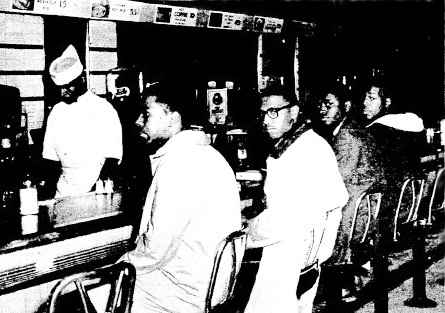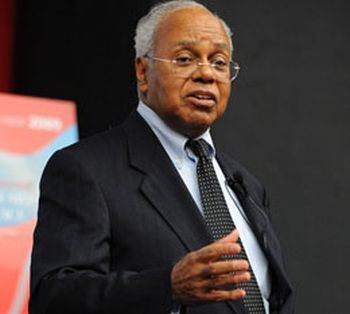Heroism at Lunch, cont’d.
I am republishing this post that I originally presented ten years ago, because of the September 4 death of Joseph McNeil, age 83. The Greensboro lunch counter has been on exhibit at the Smithsonian’s National Museum of American History in Washington, D.C. since the 1990s when it was acquired from Woolworth’s. It will be one of 250 items featured in a show of “revolutionary objects” at the museum in 2026.

Actually there was no lunch. But there was plenty of heroism when four college students sat at a Greensboro NC lunch counter in February 1960. [Above photo: Joseph McNeil is seated on the left.]
The students were told to go to the segregated snack bar in the back of the Woolworth 5 & 10 cent store, but they refused. And although the Woolworth staff would not serve them, the students also refused to leave until closing time and pledged to come back every day until they won the right to eat there.

It was an honor to hear one of the organizers of the protest at the 9th Annual Northeast Regional Fair Housing and Civil Rights conference in Springfield MA. Joseph McNeil [shown above at the conference] told a room of 500 attendees how much had hung in the balance for him at the time. A first-year student at the North Carolina Agricultural and Technical State University, he feared that he could end up in jail and disastrously interrupt his college career. (Fortunately, his fears were not realized and he went on to graduate and eventually become a major general in the U.S. Air Force.)
McNeil related how the Greensboro protest grew as students from area schools joined with the initial four, then more student protests erupted at Woolworth stores around the South. In July 1960 Woolworth reversed its policy, which had been to let local managers decide whether or not to serve Black customers based on local customs.
He explained that the sit-down protests served as “a down payment on our manhood and womanhood” for him and his fellow students. The action, he said, was driven by their belief in the “dignity of men” and “the moral order of the universe.”
In the Q & A after his talk, a woman in the audience asked what his mother had thought about his decision to join a sit-in at the lunch counter. He said she had been uneasy about it but had to agree that it was the right thing to do based on the values she and his father had taught him.
McNeil received repeated standing ovations from conference goers. Everyone laughed when he said that he had always wanted to order coffee and apple pie at a Woolworth lunch counter but when he did, “The apple pie wasn’t very good.”
© Jan Whitaker, 2025



